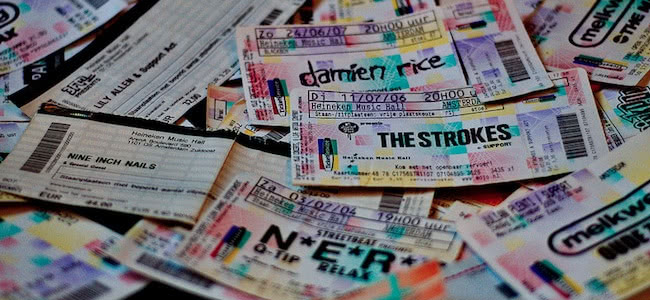A London-based web designer has come up with an idea so simple and successful, that it’s a wonder no one else has thought of it before, yet it’s become one of the UK’s fastest growing businesses in recent years.
Music fan Richard Davies has combined concert tickets sales with social media website Twitter to create Twickets, an app and account that enables fellow fans and concert-goers to exchange and sell on tickets at reasonable rates and trading, without letting scalpers and touts take advantage.
As The Daily Mail reports, the inspiration for Twickets came to Davies after he saw a fellow twitter user giving away tickets to a show for free instead of letting them go to waste. The Londoner figured there’d be others unable to attend shows with the same fair sense of spirit who were willing to sell them to real music fans at face value or less, instead of seeking out expensive and potentially risky second hand options.
Creating the @Twickets account in 2011, with the simple rule that all tickets must be sold at face value or less, the 45-year old’s business has since grown to nearly 14,000 followers who have sold on 45,000 ‘spare’ tickets; as well as successfully launching an iPhone app that topped the iTunes charts with 30,000 downloads in just over a week.
Twickets’ exponential growth has even taken on sub-accounts specifically for sporting events, theatre, and even @TwicketsTravel for “all spare train, coach, ferry, hotel and plane bookings that are going unused,” according to their official website.
“First and foremost it was set up to reduce empty seats at events which were supposedly sold out,” says Twickets creator Davies. “The other important thing is to ensure that fans are not being ripped off by overpriced tickets going spare by the expensive secondary ticket sites.”“First and foremost it was set up to reduce empty seats at events which were supposedly sold out.” – Richard Davies, Twickets
Davies’ own displeasure with the secondary market is shared by the larger British population, who have been dealt with an increase in ticket prices, as well as secondary ticket websites like Viagogo and Seatwave taking advantage by regularly marking up their prices immediately after sale of shows at the box office.
It also helps circumvent the rising number of cases of ticket scams that have appeared in the UK recently, including the jailing of a 46-year old Manchester Woman who fleeced £7,274 (approx $AU 12,000) from nearly 20 victims this past October, while a 42-year old Londoner managed a sham website that conned nearly £4 million ($AU 6.2m) before he was caught and jailed.
“Historically ticketing crime, ticketing fraud, hasn’t been reported,” said Detective Superintendent Nick Downing at the time of the man’s arrest late last year. “This causes problems because when you’re trying to get it on a policing agenda or government agenda, there are no reports.”
The Daily Mail’s Twickets article also points out that British Labour MP Sharon Hodgson has begun campaigning to prevent ticket touts, lamenting that “fans are being squeezed out of gigs and shows thanks to unscrupulous touts exploiting the talent of others.”
Locally, Australia hasn’t been without it’s fair share of ticket scalping issues. Including the recent conviction of a 22-year-old NSW man who is facing court for the sale of fake Soundwave tickets, pocketing nearly $17,000 from unwary fans across at least 60 suspicious transactions before being busted.
One of a few cases that has prompted the NSW Government to look at plans to introduce new legislation to stop the resale of tickets at greatly inflated prices. The new laws would mean that the resale of any ticket for sporting and entertainment events would need to be within 10 percent of the original price.
Still, if some entrepreneurial music fan in London can curb ticket touting with a single twitter account, and tap into what looks to be a sizeable market, who’s to say it can’t be done in Australia? Pity that snappy name is already taken.

































